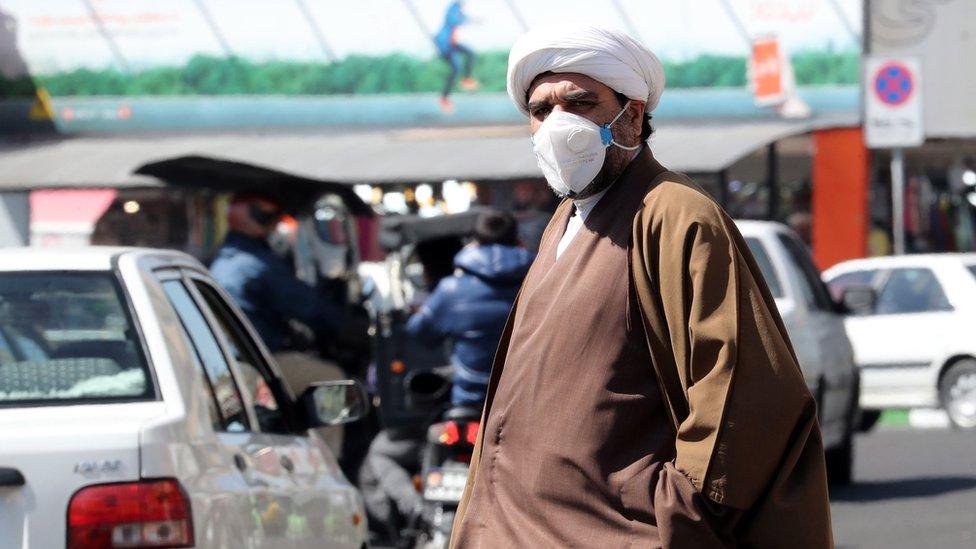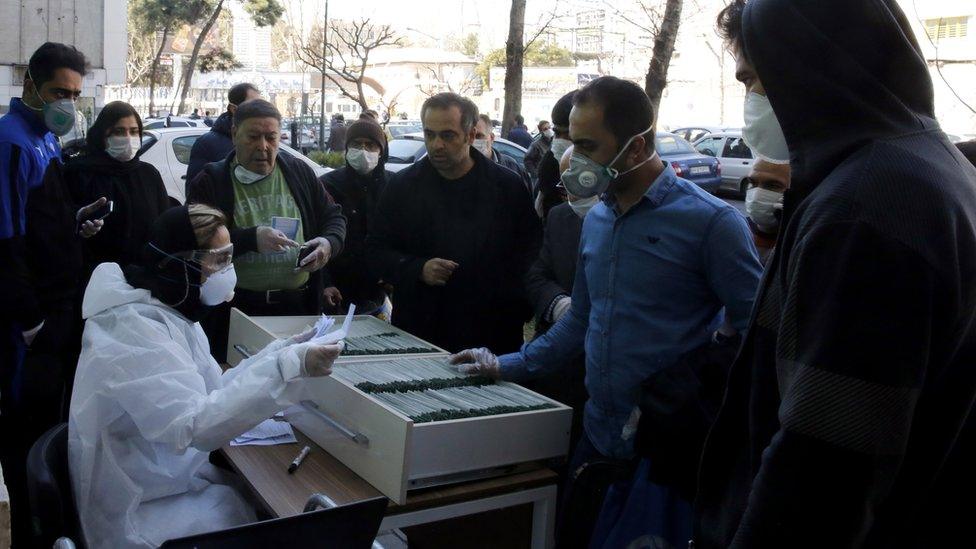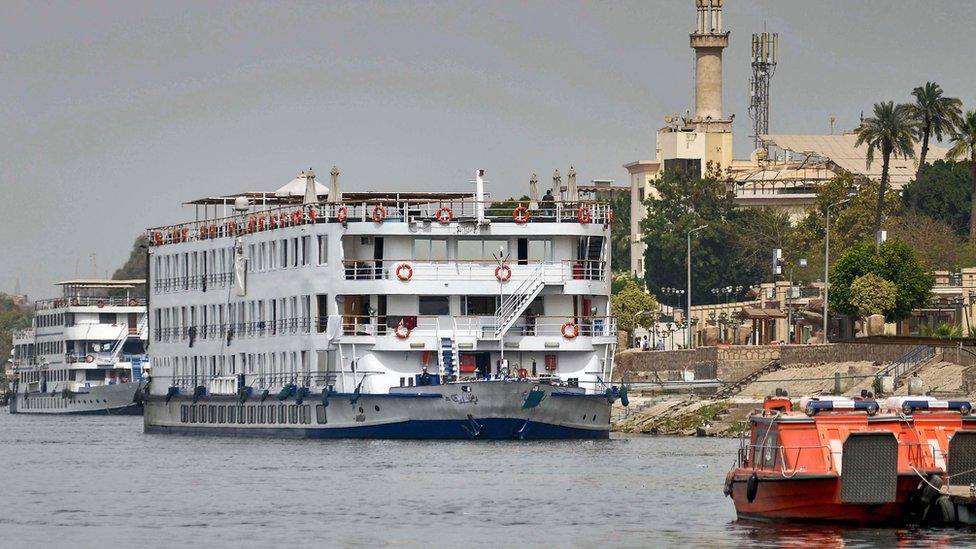Coronavirus: Iran reports leap in death toll
- Published

Tehran province is the worst affected by the new coronavirus disease
Iran has reported 43 new deaths related to the coronavirus disease in the past 24 hours, as it struggles to combat one of the world's worst outbreaks.
At least 237 people have died and 7,161 have been infected across the country since mid-February, although the real figures are believed to be far higher.
The authorities have tried to limit the spread of Covid-19 by closing schools and urging people not to travel.
But no hotspots have been put under lockdown, like in China and Italy.
Cases linked to Iran have also been reported by Afghanistan, Bahrain, Iraq, Kuwait, Lebanon, Oman, Pakistan, Qatar, Saudi Arabia and the United Arab Emirates.
What's the latest from Iran?
On Monday, health ministry spokesman Kianush Jahanpour announced for a second day in a row that more than 40 people with Covid-19 had died.


Tehran province is the worst affected with 1,945 cases of the disease, followed by Qom with 712, Mazandaran with 633, Isfahan with 601, and Gilan with 524.
Mr Jahanpour said the rate of new infections was dropping, but that it was "still too early to judge" when the outbreak would be brought under control.
Almost 2,400 people had so far recovered from the disease, he added.

EASY STEPS: How to keep safe
A SIMPLE GUIDE: What are the symptoms?
HEALTH MYTHS: The fake advice you should ignore
MAPS AND CHARTS: Visual guide to the outbreak
VIDEO: The 20-second hand wash

Meanwhile, local media said the reformist politician Mohammad Reza and the high-ranking Shia Muslim cleric Ayatollah Reza Mohammadi Langeroudi were among the latest fatalities.
In a separate development, 16 Iranians died from methanol poisoning in Khuzestan province after false rumours spread that drinking alcohol would help prevent people getting the Covid-19 virus, the official Irna news agency reported.
Meanwhile, Iran's Supreme Leader, Ayatollah Ali Khamenei, has cancelled a speech he was expected to deliver to a large crowd in the holy city of Mashhad later this month for Nowruz, the Persian New Year.

There is widespread fear and concern about the outbreak in Iran
Some people believe the Iranian authorities are understating the true extent of the outbreak, and members of parliament have publicly challenged their figures.
On Saturday, about 16,000 people suspected of having Covid-19 were being treated at hospitals in major cities, according to Mr Jahanpour.
A representative of Health Minister Saeed Namaki was also quoted by local news agencies as saying that "around 200 people have died" from Covid-19 in Gilan alone. But the official later retracted his statement, saying the figure included those who had died from other diseases.

Virus hits highest levels of Iran's government
By Tse Yin Lee, BBC Monitoring
Iranian officials have downplayed the severity of the outbreak, but about 30 or so have tested positive for the Covid-19 virus in less than three weeks.
They include Masoumeh Ebtekar, one of Iran's 11 vice-presidents, who reportedly attended a meeting with President Hassan Rouhani and a number of cabinet ministers shortly before it was confirmed that she was carrying the virus.
Deputy Health Minister Iraj Harirchi, who led the government's Covid-19 task force, meanwhile tested positive a day after being filmed mopping sweat from his brow during a news conference.
The head of emergency medical services, Pirhossein Kolivand, and Esmail Najjar, who is responsible for the Interior Ministry's crisis management, have also been infected.
At least 24 members of Iran's parliament - about 10% - have tested positive for the virus and two have died as a result of it: Fatemeh Rahbar, a conservative who had recently been elected to represent Tehran, and Mohammad Ali Ramezani, who had been elected in Gilan.
Some Iranians have speculated that the reason that so many officials have the Covid-19 virus is because it was already circulating before the parliamentary election on 21 February and that the government suppressed information because it did want to reduce turnout - a key indicator of legitimacy.
Others have wondered whether it is simply because Iranian officials have better access to testing kits.

What's happening elsewhere in the region?
Saudi Arabia announced that anyone failing to declare correct health-related information and travel details as they entered the country would be liable to a fine of up to $133,000 (£102,000).
Officials have said that some of the Saudi citizens with Covid-19 failed to disclose that they had travelled to Iran on their return to the kingdom.

Passengers and crew of the Nile cruise ship A Sara are reportedly being quarantined
The Saudi authorities have also imposed a temporary lockdown on the predominantly Shia Muslim eastern region of Qatif, where most of the Covid-19 cases have been reported, and suspended flights from nine countries, including Italy, South Korea, the UAE and Egypt.
Egypt reported its first death linked to the disease on Sunday - a 60-year-old German tourist who tested positive after being admitted to a hospital in the Red Sea resort of Hurghada on Friday.
The tourist had previously visited in the southern city of Luxor, where 45 people suspected of having the Covid-19 virus were evacuated from a Nile cruise ship on Saturday and placed in isolation on land.
On Monday, a member of a French tour group, Philippe Gruwe, told AFP news agency that about 80 passengers and crew were being quarantined on board.
The tests were carried out after the World Health Organization informed Egypt that a Taiwanese-American tourist who had been on the ship was infected.